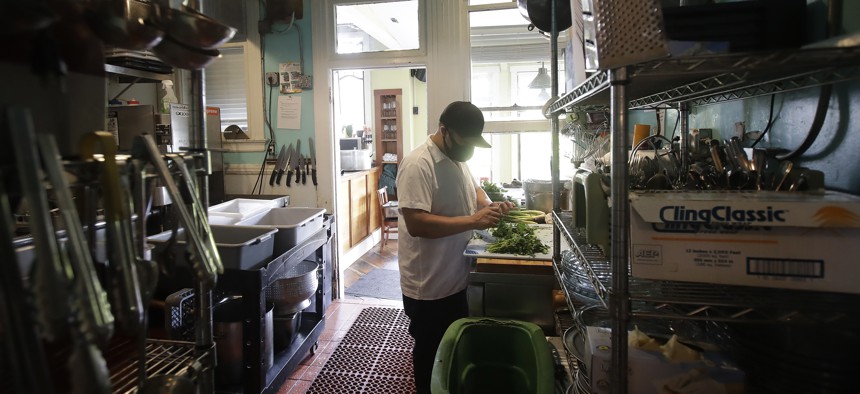Health Inspections Take on New Role in Monitoring Restaurant Safety

Jesus Cruz, prep cook at Blue Plate, covers his face with a mask while working in the kitchen at the San Francisco restaurant, during the coronavirus outbreak Thursday, May 14, 2020. AP Photo/Jeff Chiu
Local health departments that suspended in-person inspections of restaurants and bars are beginning to restart their programs and now have even more responsibilities than before, like enforcing social distancing.
Some local health inspection programs tasked with monitoring food safety at bars and restaurants ceased operations during the coronavirus pandemic, even as those outlets continued serving patrons through takeout and delivery service.
Now as restaurants begin to reopen for dine-in customers, local agencies face the challenge of resuming food safety inspections while also taking on new responsibilities like evaluating whether social distancing requirements are being followed properly.
“They are looking at how do they work with retail food establishments to get them back up and running,” said Jennifer Li, the senior advisor for programs with the National Association of County and City Health Officials. “It is very challenging.”
In a survey of 36 local health departments conducted anonymously in May, NACCHO found that many food safety programs reduced operations at least somewhat because of the coronavirus outbreak. Some were shut down entirely, while others had staff reassigned to other coronavirus response tasks.
“Of the 36, almost all of them did experience some sort of disruption,” Li said.
When health departments come back online, many will be tasked with new responsibilities. In addition to assessing food safety protocols like making sure food is stored at the appropriate temperature, inspectors may also end up evaluating restaurants on staff use of personal protective equipment, whether their interior layout allows for proper social distancing, or whether their customers remain within restricted capacity limitations, Li said.
The Mecklenburg County Department of Health and Human Services in North Carolina is one such agency that suspended in-person health inspections during the pandemic.
Now that bars and restaurants are reopening in the state, the department is resuming in-person inspections that will include an evaluation of safety measures such as proper social distancing and use of personal protective equipment, Rebecca Carter, a spokeswoman for the department told the Charlotte Observer.
“We are following state guidance and want to stress the importance of social distancing and handwashing,” she said.
When restaurants were only offering takeout or delivery service, health department officials remained in contact to provide guidance on cleaning procedures, employee health and sanitation issues related to Covid-19, Carter said.
Elsewhere, health departments have already incorporated coronavirus-related guidance into their inspections.
In Ohio, the Columbus Public Health Department conducted nearly 800 compliance checks at restaurants over the last two weekends and issued about two dozen warnings, Columbus Business First reported. Warnings from last weekend included instances in which restaurants failed to properly enforce social distancing and employees failed to wear masks.
Health departments may face new hurdles in resuming their inspection work and many are thinking through new ways to address the issue while the coronavirus outbreak continues, Li said. One challenge will be figuring out how to physically do their work while keeping inspectors safe during site visits.
“The kitchens are usually tight spaces so how do you do that?” she said, highlighting one such concern.
Some departments are exploring the idea of whether they could conduct virtual inspections for any complaint or transition over to do more risk-based inspections that would prioritize sites based on violation history or other characteristics, Li said.
Food safety concerns have also drawn attention on Capitol Hill, where Democratic leaders of the House Energy and Commerce Committee wrote this week to the Food and Drug Administration to inquire about the status of federal food processing facility inspections.
In March, the FDA suspended all domestic routine surveillance facility inspections.
“Consumer protection advocates are concerned this reduction makes an already weak inspection system even weaker, while other experts believe the ultimate impact will be limited as the food companies themselves are the primary testers, not FDA, in assessing the safety of its product,” wrote Reps. Frank Pallone and Diane DeGette in a May 27 letter.
The lawmakers went on to ask the FDA to explain what guidelines it would use to determine when it will restart in-person surveillance of domestic food manufacturing facilities and inspections of foreign food facilities or imports. The FDA was asked to respond by June 10.
Andrea Noble is a staff correspondent with Route Fifty.
NEXT STORY: Democratic State Attorneys General Push Back on Trump Social Media Order





